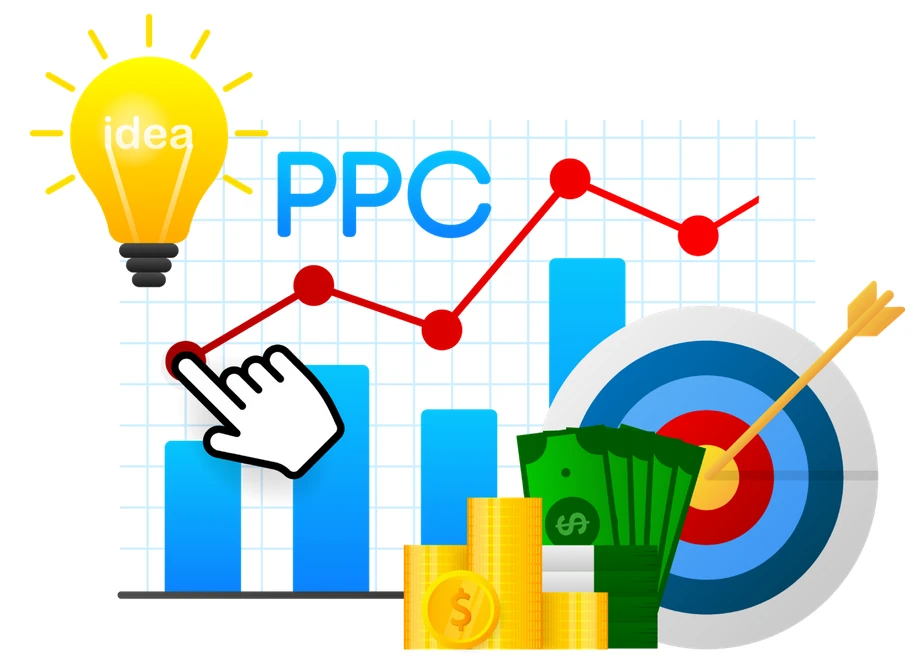Pay-per-click (PPC) advertising is a cornerstone of digital marketing strategies for businesses of all sizes. By enabling advertisers to pay only when a user clicks on their ads, PPC offers an efficient way to drive traffic, generate leads, and increase sales.
The real-time bidding environment of PPC platforms like Google Ads and Facebook Ads provides businesses with the flexibility to adjust their advertising efforts based on performance data and market conditions.
Role of Virtual Assistants in PPC Management
As PPC campaigns become more intricate and competitive, many businesses find it challenging to manage and optimize these campaigns effectively. This is where virtual assistants (VAs) come into play. VAs can handle a wide range of tasks from keyword research to ad copywriting and performance monitoring, allowing businesses to maintain high-performing campaigns without overstretching their in-house resources.

Understanding PPC Campaign Management
Key Components of PPC Campaigns
Effective PPC campaign management revolves around several critical components:
- Keyword Research: Identifying the right keywords is foundational to the success of any PPC campaign. It involves understanding what potential customers are searching for and how they are searching.
- Ad Copy: Creating compelling ad copy is essential. The copy needs to be engaging, relevant, and should include a clear call to action.
- Landing Pages: The effectiveness of PPC ads often hinges on the quality of the landing pages to which they direct traffic. These pages must be optimized for conversion, providing a seamless and relevant experience for visitors.
- Bid Management: This involves setting and adjusting bids for different keywords to ensure optimal placement of ads within budget constraints.
- Analytics and Reporting: Monitoring the performance of campaigns through analytics tools is crucial. It helps in understanding the effectiveness of different keywords, ad copy, and bidding strategies.
Common Challenges in PPC Management
Managing PPC campaigns can present several challenges:
- Budget Management: Allocating budgets efficiently across campaigns while maximizing ROI can be complex, especially for businesses with limited financial resources.
- Keyword Competition: High competition for popular keywords can make it expensive and challenging to achieve top ad placements.
- Changing Market Trends: Keeping up with rapid changes in market conditions and consumer behavior can require constant adjustments to campaigns.
- Quality Score Optimization: Google’s Quality Score affects ad placement and bid costs, making its optimization a critical but often difficult task.
Roles of Virtual Assistants in PPC
Virtual assistants can take on various roles to enhance the effectiveness of PPC campaigns:

Keyword Research and Selection
Virtual assistants can perform detailed keyword research to identify high-opportunity keywords based on search volume and competition. They can also monitor keyword trends and adjust strategies accordingly to maintain campaign relevance and effectiveness.
Ad Creation and Setup
Virtual assistants can manage the creation and setup of ad campaigns, including:
- Writing Ad Copy: Crafting messages that resonate with the target audience.
- Ad Design: For display ads, creating visually appealing graphics.
- Campaign Setup: Configuring the settings for different ad platforms, such as targeting options, budgets, and schedules.
Monitoring and Optimization
Once PPC campaigns are live, virtual assistants can:
- Track Performance: Monitor metrics like click-through rates, conversion rates, and ROI.
- Make Adjustments: Optimize bids, refine keywords, and tweak ad copy based on performance data.
- A/B Testing: Conduct tests to compare different aspects of campaigns to find the most effective settings.
Reporting and Analysis
Virtual assistants can compile detailed reports that provide insights into:
- Campaign Performance: Overview of metrics and achievement of KPIs.
- Strategic Adjustments: Recommendations for future campaigns based on past performance.
- Budget and Spend Analysis: Review of expenditures and suggestions for budget reallocation.
This comprehensive approach by virtual assistants helps businesses not only maintain but also scale their PPC efforts effectively.
Benefits of Using Virtual Assistants for PPC
Cost Efficiency
One of the primary advantages of utilizing virtual assistants for PPC management is cost efficiency. Hiring a full-time PPC specialist can be expensive, especially for small or medium-sized businesses. Virtual assistants offer a flexible workforce solution where businesses only pay for the services they need, when they need them, thus significantly reducing labor costs and overhead.
- Reduced Labor Costs: Virtual assistants can be hired at a lower cost compared to full-time employees.
- Flexibility in Scaling: Businesses can scale their PPC efforts up or down without the financial implications of hiring or laying off staff.
Enhanced Campaign Performance
Virtual assistants can enhance the performance of PPC campaigns through meticulous management and constant optimization. With the ability to focus solely on PPC tasks, virtual assistants ensure that campaigns are closely monitored and adjustments are made promptly to maximize effectiveness.
- Continuous Monitoring: With a dedicated VA, campaigns are constantly reviewed for performance dips and opportunities.
- Expertise and Specialization: Virtual assistants often bring specialized expertise in PPC, having managed multiple campaigns across various industries.
Scalability and Flexibility
The scalability and flexibility offered by virtual assistants make them an ideal choice for businesses looking to expand their digital marketing efforts without committing to permanent resource allocation.
- Quick Adaptation to Market Changes: Virtual assistants can quickly implement changes to adapt to evolving market trends.
- Ease of Resource Allocation: Businesses can allocate more resources towards PPC during peak times and scale back during slower periods without any HR complexities.
Collaborating with Virtual Assistants to Enhance PPC Strategy
Selecting the Right Virtual Assistant
Choosing the right virtual assistant is crucial for the success of your PPC campaigns. Consider the following factors:
- Experience and Expertise: Look for VAs with proven experience in managing PPC campaigns similar to yours.
- Communication Skills: Effective communication is vital to ensure that your objectives and strategies are clearly understood and implemented.
- Reliability and Track Record: Check references and reviews to gauge the reliability and past performance of the VA.
Training and Tools Required
To fully integrate a virtual assistant into your PPC efforts, ensure they are equipped with the right tools and training:
- Access to PPC Platforms: Virtual assistants should have access to all necessary PPC platforms such as Google Ads, Bing Ads, etc.
- Analytics Tools: Familiarity with analytics tools like Google Analytics is essential for tracking campaign performance.
- Training on Specific Tools and Platforms: If your campaigns use specific tools or platforms, provide training to the VA to ensure they are proficient in using them.
Check out the tools using by Virtual Assistants everyday.
Setting Expectations and KPIs
Clear expectations and well-defined KPIs are essential for monitoring the effectiveness of your PPC campaigns managed by virtual assistants:
- Performance Metrics: Define clear metrics such as click-through rate, cost per click, conversion rate, and ROI.
- Regular Reporting: Set up a schedule for regular updates and reports to keep track of progress and make data-driven decisions.
- Communication Guidelines: Establish how often and through what means you will communicate with your VA to ensure smooth operations.
This strategic approach to implementing virtual assistants into PPC management can significantly enhance campaign efficiency and effectiveness.
Case Studies and Success Stories
Example 1: Small Business Success
A small online boutique specializing in handmade crafts utilized a virtual assistant to manage their PPC campaigns during a major holiday season. The VA conducted extensive keyword research, optimized ad copy, and adjusted bids regularly. As a result, the boutique saw a 50% increase in traffic and a 30% increase in sales compared to the previous year, with a significant reduction in cost per acquisition.
- Key Actions: Targeted keyword optimization, seasonal ad copy, continuous bid adjustments.
- Outcome: Increased traffic and sales with improved ROI.
Example 2: E-commerce Growth
An e-commerce company selling health supplements enlisted a virtual assistant to overhaul their PPC strategy. The VA implemented A/B testing for different ad formats and landing pages, leading to a 40% increase in conversion rates. They also refined the audience targeting to reach more relevant customers, which decreased the bounce rate by 20%.
- Key Actions: A/B testing, audience refinement, landing page optimization.
- Outcome: Higher conversion rates and more engaged website traffic.
These examples illustrate how virtual assistants can bring tangible benefits to PPC campaigns, enhancing both the efficiency and effectiveness of digital advertising efforts.
Conclusion
The integration of virtual assistants into PPC management offers numerous benefits, including cost efficiency, enhanced campaign performance, and greater scalability. By delegating routine and complex tasks to a VA, businesses can focus on strategic growth while maintaining tight control over their advertising budgets.
- Cost Savings: Significant reductions in labor costs and improved budget allocation.
- Improved Campaign Metrics: Better campaign results through meticulous management and optimization.
- Flexibility and Scalability: Ability to easily scale PPC efforts in response to business needs.